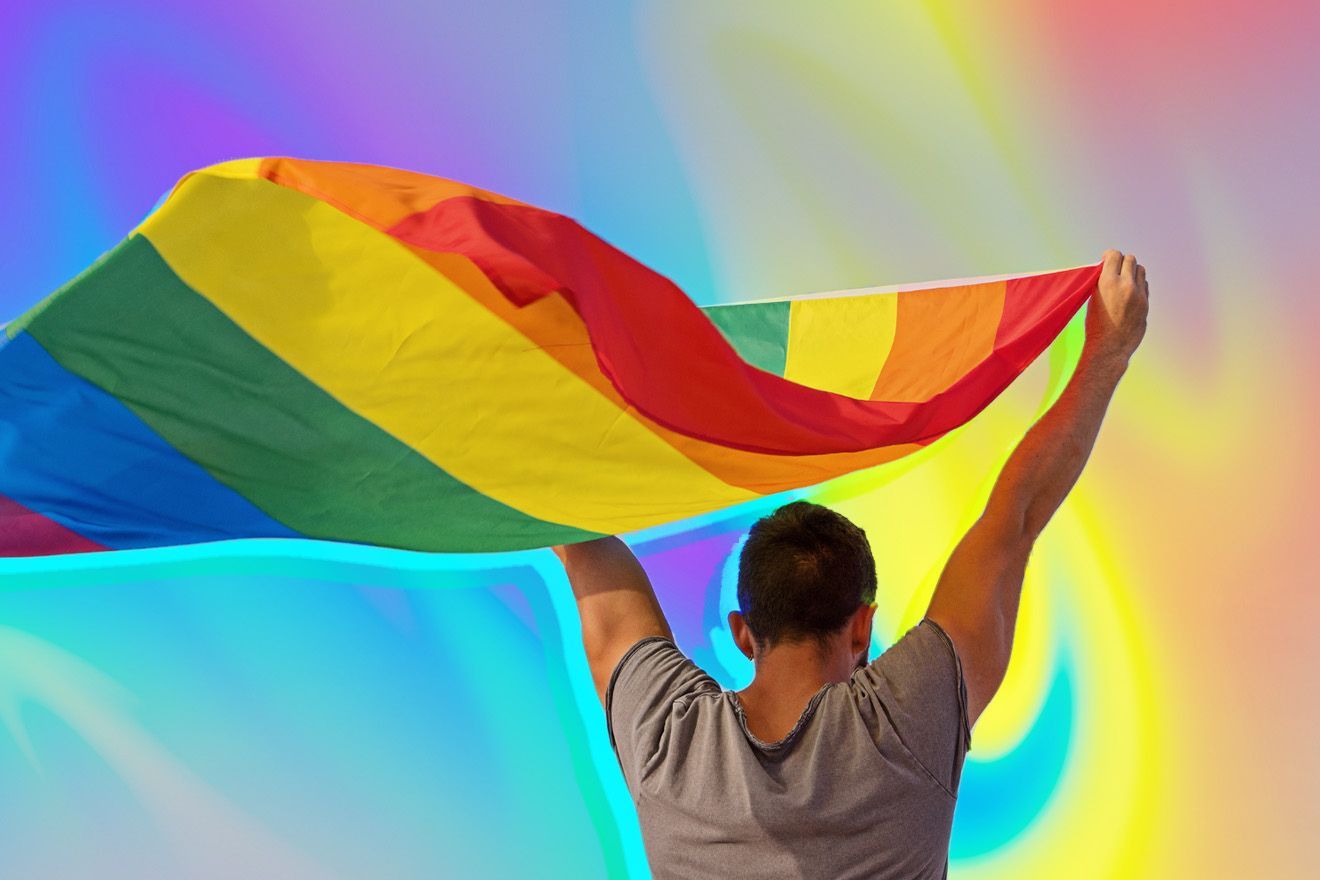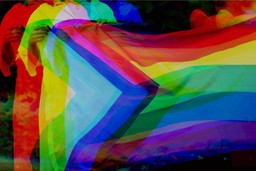With the recent launch of “Queering Psychedelics” and a personal end-of-the-year reflection, I got to thinking about my own journey of self-discovery, self-actualization, and self-love through the intentional use of psychedelic medicines. Although the real work began just a few years ago, my first experience with the intersection of psychedelic mushrooms and becoming consciously aware of having a non-cisgender identity happened decades ago. Although the outcomes weren’t entirely disastrous, the experience certainly had all the ingredients of a bonafide train wreck.
I sure didn’t know much at the time – not about myself and certainly not about how to best use psychedelic medicines intentionally or productively. This time was around the late 1980s/early 1990s. For anyone else who was old enough to experience the excesses of this era, everything was overboard, from the hair to the use of all kinds of mind-altering substances. I was in my mid-20s and working as a bartender in a popular nightclub in Vancouver, Canada. It was a Saturday summer night, and things kind of went sideways.
A Night to Remember
I’m not going to incriminate anyone here, but someone got their mitts on an ounce bag of psilocybin mushrooms, and someone else thought it would be a good idea to blend it all up in a smoothie and a few of us gulp it back before our shift. The mistakes of our youth, no doubt. All I remember is that the nightclub had magically transformed into a huge tiki bar with palm trees, grass huts, and grass skirts to match – and for some reason, I was still able to pour drinks.
By the end of my shift, I had pretty much lost it, and I remember asking a bar back to count my cash because counting was beyond the ability of my current cognitive state. Off I went, stumbling into the night, making my way to a highrise building site that was still under construction, scaling the security fence, and then climbing the building’s fire escape up to the rooftop overlooking the city. The lights of Vancouver danced around me through the dark, and as I sat and looked out across the skyline, I said aloud to myself for the very first time, “I think I’m bisexual.” And at that moment, I felt a release of shame, and I recall the excitement and nerves in uttering those words under the watch of the summer night sky.
Psychedelic Homophobia
Despite my complete lack of set, setting, dosing protocol, intention, and gratitude, the mushroom opened my heart. It momentarily provided me with the love and courage to face a truth about myself that I worked very hard to suppress. It would still take me about another ten years to figure things out about my sexual orientation and act on them, and many more to work through the layers of shame and denial to find a core of self-love that didn’t look past my sexual orientation, but included it as just another part of me.
Although my psychedelic experience with that glimmer of enlightenment all those years ago was arguably positive in the development of my personal identity, there’s a dark scar on the history of psychedelics for the LGBTQ community with misguided attempts in the 1960s to convert LGBTQ people to lives of cisgender ‘normality’ using psychedelic medicines as the catalyst.
As noted in an article on Chacruna, “The history of psychedelic homophobia is replete with harrowing stories of LGBTQ people targeted for treatment of ‘sexual perversion.’ We also know from published case reports that people used large doses of LSD in conversion therapies to treat patients.” The article goes on to report that Timothy Leary proclaimed, “The fact is that LSD is a specific cure for homosexuality.” And even beloved cultural icon Richard Alpert, later known as Ram Dass, “…used psychedelic medicines to encourage gay men to become heterosexual. Alpert published accounts in which he claimed treatment with LSD helped his “homosexual” patient stay in a long-term relationship with a woman. Alpert himself was closeted at the time and later spoke publicly about being attracted to men.”
Psychedelics & Healing LGBTQ Trauma
Historical Context and Harmful Practices
It’s important that we frame these harmful practices in the historical context in which they occurred, as the Diagnostic and Statistical Manual of Mental Disorders (DSM) still included homosexuality until 1973. The author of the Charuna article, Alexander Belser, PhD, goes on to say, “Today, conversion therapy is considered to be unethical, anti-therapeutic, and profoundly harmful to those who undergo it. The American Psychological Association Task Force reported risks involved “confusion, depression, guilt, helplessness, hopelessness, shame, social withdrawal, suicidality, substance abuse, stress, disappointment, self-blame” and other adverse effects.”
Follow your Curiosity
Sign up to receive our free psychedelic courses, 45 page eBook, and special offers delivered to your inbox.In the early stages of the AIDS epidemic, demoralization was deemed a major clinical issue for those grieving. Defined as “existential suffering characterized by poor coping, sense of helplessness, hopelessness, and loss of meaning and purpose,” demoralization cast a deeper shadow over the LGBTQ community during these tragic times.
Psychedelic-Assisted Therapy and Expert Insights
Psychotherapeutic approaches to reduce demoralization proved to be only marginally effective, and so psychedelic mushrooms were introduced in a study conducted by Anderson et al. from 2017 through 2019. This study demonstrated, following good clinical practices, the feasibility, relative safety, and potential efficacy of psilocybin-assisted group therapy for demoralization in older long-term AIDS survivors.
I asked Dr. Kile Ortigo, who specializes in working with psychedelics for the LGBTQ community, to share some of his thoughts on the subject. As a clinical psychologist who helps clients navigate psychedelic experiences, Dr. Ortigo is also the founder of the Center for Existential Exploration and specializes in personalized methods to help people connect to a deeper sense of meaning and understanding of the self. His work is supported by exploring personal values, spirituality, underlying emotions, and recovery from painful life experiences, which may involve trauma, loss, medical illness, and/or periods of difficult transitions.
Dr. Ortigo notes, “An important thing to remember about efforts to use psychedelics in conversion therapy is that they not only inevitably fail but they also tend to backfire spectacularly. Having powerful experiences, for example, of universal love or even pure cosmic awareness tend to undermine narrow-minded, humancentric, and culture-bounded notions of ‘normal-vs-abnormal’ sexuality and gender expression.”
Psychedelics for the LGBTQ Community
The Velvet Rage
In “The Velvet Rage” by psychologist Alan Downs, the author explores the impact of growing up and surviving as a gay man in a culture that still struggles to accept the beautiful tapestry of human identity – in all its glorious colors. Pulling inspiration from his own struggles with shame and anger, stories from his patients, and various research studies, the author describes the stages of a gay man’s journey out of shame and offers strategies to stop the cycles of avoidance and self destructive behavior. Although Mr. Downs doesn’t include psychedelics as one of the tools to assist with this journey, the Psychedelic Renaissance and those working with the medicines certainly shed new light on ways to unfold one’s true self and live one’s life with meaning and purpose.
Personal Healing and Self-Acceptance
So where does this leave those folks who are curious and even eager to explore psychedelics for the LGBTQ community as a way to work on their own healing, discovery, development and ascension? I can attest to my own journey which has been an opening of my eyes, my mind, and especially my heart. Through intentional shadow work with the medicines combined with a spiritual practice that includes meditation, mindfulness and daily expressions of gratitude, I’ve come to accept and love myself as I am. I’ve learned that my worth comes from my goodness as a loving, compassionate human being and has nothing to do with my sexuality or sexual orientation.
Digging into the shadows, I went back and learned that my yearning to fit in and find my tribe, love, and validation was an aimless pursuit because what I sought was with me all along – just like it’s within each of us. And so it continues, the eternal, daily work of becoming whole and being true. But what does this have to say about the larger cultural implications of psychedelics for the LGBTQ community. For this, I quote, Dr, Ortigo:
“The idea that the psychedelic world would need to discuss and advocate for queer inclusivity was, at first, perplexing. Queerness is about playing with and deconstructing strict and rigid notions of identity. Aren’t psychedelics already inherently queer in that sense? Do they not make us question our own pre-existing assumptions about our sense of self and even reality?
Cultural Implications and Embracing Complexity
Common aphorisms that emerge from psychedelic journeys include “We’re all One” and “It’s all about love,” yet sometimes people don’t return with these messages. Or probably more often, they don’t know how to integrate them into their everyday life. On the other hand, we have the problem of spiritual bypass. On occasion, we can co-opt these uplifting ideas of universality to help us ignore our genuine differences and lived experiences. Some self-proclaimed psychonauts will comment, “Man, you really don’t get it if you’re still talking about identity politics” or “You haven’t done a high enough dose yet.” The antidote, I believe, is to expand our ability to hold complexity, practice humility and compassion, and embrace both/and thinking.”
I have to agree with Dr. Ortigo – embracing both/and thinking is key to understanding, and through understanding, compassion manifests. The truth is, these non-ordinary states of consciousness have the ability to take us to places beyond the human experience. The insights gleaned from these privileged psychedelic experiences should deepen our understanding and appreciation of the many expressions of being human, awaken us to the power of the present moment, and just be better, nicer humans.







